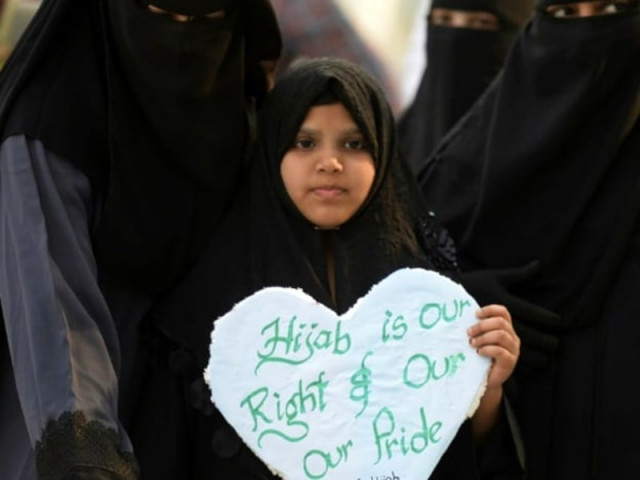School hijab row highlights India's religious divide
'Before this, there was no Hindu/Muslim between us, but now everything has become different'

Facing a choice between her schooling and her religious beliefs, A.H. Almas says she had no choice at all.
The 18-year-old Muslim pupil at the Women's Pre-University College in Udupi in majority-Hindu India has been wearing the Islamic headscarf since she was a child.
But in December, authorities banned her and at least four of her schoolmates from class for wearing the hijab.
"They are making us choose between our faith and our education," she told AFP. "What kind of equality is this?"
Read more: Hijab-clad Muslim student confronts RSS goons in India’s Karnataka
The girls have been demonstrating ever since. In response, Hindu teenagers in Udupi have repeatedly gathered in saffron-coloured shawls symbolising their own religion.
Footage has gone viral of one hijab-wearing student being pursued by Hindu men yelling "Jai Shri Ram" (Hail Lord Ram) as she arrives at her college in the Karnataka town of Mandya, shouting "Allahu Akbar" in response.
A college student in India’s Karnataka state was heckled by RSS goons as she made her way to her class, security personnel tried to ward off the boisterous crowd. In response to their chants, the woman bravely shouted, "Allahu Akbar!"
— The Express Tribune (@etribune) February 8, 2022
For more: https://t.co/Z921GRGUWY#etribune pic.twitter.com/U5nbyprVFJ
Protests have been held in many of India's biggest cities, including Delhi, Mumbai and Kolkata, as well as in neighbouring Pakistan -- where the foreign ministry summoned an Indian diplomat to protest.
And Nobel laureate winner Malala Yousafzai -- awarded the prize for her work for female education -- expressed her support for the girls.
"It's a small thing, it's a basic right," Almas said. "We never thought it would go so far."
According to Almas, the school used to conduct prayers on Hindu festival days and Muslim pupils never objected.
"Our friends who we used to gossip and have lunch together with are now opposing us," she said.
Also read: Protests over classroom hijab ban grow in India
"Before this, there was no Hindu/Muslim between us, but now everything has become different."
The stand-off has heightened fears among Muslims in India, who feel increasingly attacked under the government of Hindu nationalist Narendra Modi, who has brought religious symbolism into public life like no previous leader.
His Bharatiya Janata Party (BJP) has been accused of undermining India's secular and democratic foundations and fuelling an environment of fear and intimidation among minorities.
"It was just a students' issue and they have made it communal," said Aliya Sadiq, 17, another of the banned Udupi pupils.
The hijab is an important article of faith for many Muslim women and has been controversial in several countries, including France, which banned it in public schools in 2004.
Udupi's BJP MP Raghupathi Bhat insisted that the measure was driven by school uniform rules and that hijabs were allowed up to the classroom door.
"When you sit in the classroom you are equal," he said. "In education, don't bring religious matters."
But activists say the ban has intensified fears of rising hate against Muslims in the country under the Modi government.
"We have men going around in saffron robes, a sitting minister in the union cabinet in saffron robes. We have the chief minister of our biggest state who is forever in saffron robes, so what business do these people have to question the girls in hijab?" said Zakia Soman, founder of the Bharatiya Muslim Mahila Andolan, an Indian Muslim women's collective.
The dispute has also highlighted concerns over whether the hijab is a means for conservative patriarchal Muslims to assert control over women.
Social activist Shabnam Hashmi condemned the ban but said that by identifying headscarves with religious identity, the dispute "helps the Muslim right wing".
"You create a stereotype of the Muslim woman, and then you want to fit every Muslim woman into it," she said.
Student Almas has her hopes pinned on the state's high court, which is hearing petitions challenging the hijab ban -- and she insisted the headscarf was not an instrument of Islamic repression of women.
"It is my pride," she said.





1723611379-0/BeFunky-collage]____-(79)1723611379-0-208x130.webp)













COMMENTS
Comments are moderated and generally will be posted if they are on-topic and not abusive.
For more information, please see our Comments FAQ